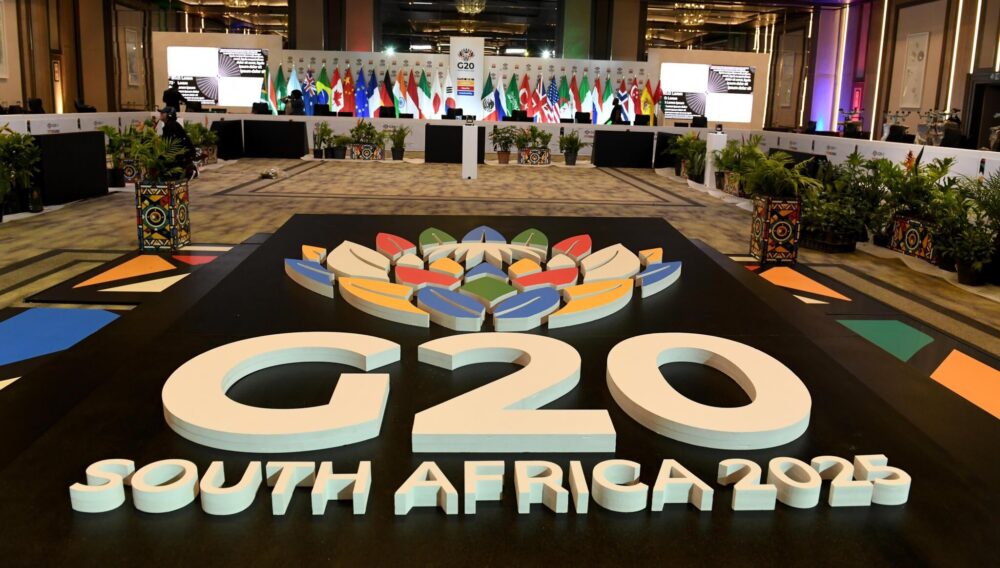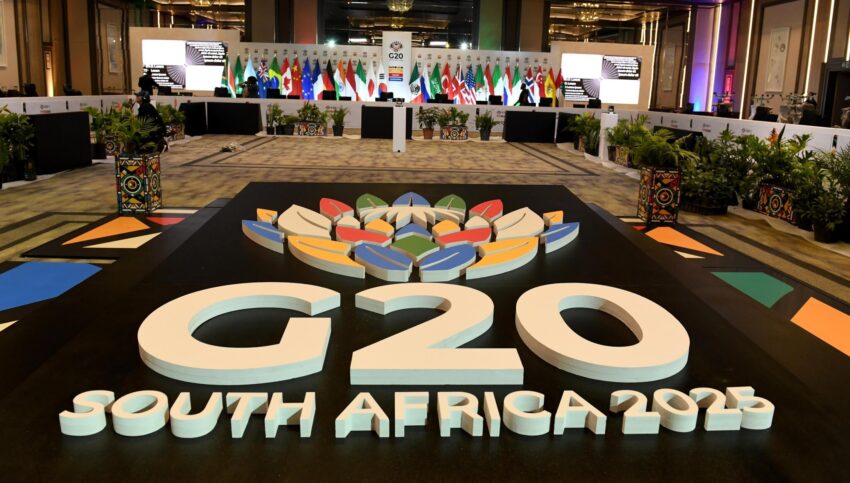
South Africa heads the G20 in 2025. (@G20org/X)
South Africa’s G20 finance track has reiterated calls for reform of the International Monetary Fund (IMF), with a special focus on revising quotas that determine countries’ contribution, access to finance and voting rights.
During the third meeting of G20 finance ministers and central bank governors last week, the finance track supported the restructuring of the international financial architecture with enhanced country risk evaluation.
“We reaffirm our commitment to a strong, quota-based, and adequately resourced IMF at the centre of the global financial safety net. We have advanced the domestic approvals for our consent to the quota increase under the 16th general review of quotas, and we look forward to finalising this process with no further delay,” a communique at the end of the meeting stated.
“We acknowledge the importance of realignment in quota shares to better reflect members’ relative positions in the world economy while protecting the quota shares of the poorest members. We acknowledge, however, that building consensus among members on quota and governance reforms will require progress in stages.”
Last week’s meeting was part of a series of forums held under South Africa’s year-long G20 presidency and ahead of the main summit of G20 leaders in Johannesburg in November.
The finance track delegates backed a declaration agreed in April, for the development of a set of principles guiding future discussions on IMF quotas and governance, to be concluded by the next IMF spring meeting in 2026.
According to the G20 finance track, IMF reforms are meant to enhance its efficiency and effectiveness — essential for generating “strong economic growth and creating more and better jobs”.
Critics have spoken of “excessive imbalances” in IMF representation, calling for reforms that could lead to country-specific reforms and multilateral coordination “in a way that contributes to an open global economy and without compromising sustainable global growth”.
Think Tank 20, a G20 working group composed of international think tanks, recently made similar recommendations for the overhaul of IMF governance and financing models, ensuring that “no individual country should have veto power” and increased transparency in the methodologies of credit rating agencies.
In June, Youth 20 (Y20) working groups issued their own statement emphasising the importance of multilateral cooperation, national sovereignty and enhancing the participation and inclusion of young people in tackling the problems facing the world.
While acknowledging the importance of the IMF in global financing, the finance track conceded that building consensus among members on quota and governance reforms will take time because Global South countries negotiate their demands against Global North priorities.
The track outlined the factors affecting global economic growth, financial and price stability — heightened uncertainty and “complex challenges” including wars, geopolitical and trade tensions, disruptions to global supply chains, high debt levels and frequent extreme weather events and natural disasters.
“In light of high public debt and fiscal pressures, we recognise the need to raise long-term growth potential by pursuing growth-oriented macroeconomic policies, while building fiscal buffers, ensuring fiscal sustainability, encouraging public and private investments and undertaking productivity-enhancing reforms,” the communique said.
It also recommended central bank independence and revitalising the World Trade Organisation (WTO). The G20 central bank governors committed to ensuring price stability, data-driven policy adjustment and policy consistency with their respective mandates.
“We will continue to pursue efforts that advance prosperity and recognise the importance of the World Trade Organisation to advance trade issues, and acknowledge the agreed-upon rules in the WTO as an integral part of the global trading system,” the communique said.
“We recognise the WTO has challenges and needs meaningful, necessary, and comprehensive reform to improve all its functions, through innovative approaches, to be more relevant and responsive in light of today’s realities.”
The finance ministers and governors urged the international community to support vulnerable countries whose debt is sustainable but which face liquidity problems, and encouraged IMF and the World Bank to work on feasible options to support these nations.
The finance track also underscored the importance of “sustainable finance” by ensuring “robust, resilient and effective coordination” between multilateral development banks, climate funds and others in support of national priorities.
“Scaling up co-financing and mobilising private sector resources by improving efficiency and promoting the use of innovative financial instruments is essential for developing countries’ risk-sharing in country-led climate investments,” said the communique.
The ministers and governors reaffirmed their commitment to addressing vulnerabilities and promoting an open, resilient and stable financial system, which supports economic growth, and is “based on the consistent, full and timely implementation of all agreed upon reforms and international standards, including Basel III”.
Basel III is an internationally agreed set of measures developed by the Basel committee on banking supervision in response to the financial crisis of 2007-09, aimed at strengthening the regulation, supervision and risk management of banks.
The finance track backed the G20 roadmap for enhancing cross-border payments; regional financial action task forces to combat money laundering; and implementation of partnerships on financing micro, small and medium enterprises.
The finance ministers and central bank governors highlighted the importance of pandemic prevention, preparedness and response and called for more support for the pandemic and global health funds to strengthen medical infrastructure.
“We emphasise the importance of effective and efficient health spending and domestic resource mobilisation, given the current reduction in donor assistance, as well as the need for better coordination and alignment of external and domestic funding flows,” the communique stated.
The finance ministers and central bank governors’ will meet in October in Washington DC in preparation for the November summit and handover of the G20 presidency from South Africa to the United States.
